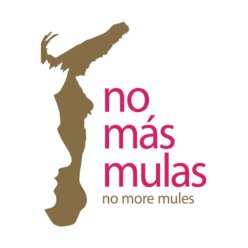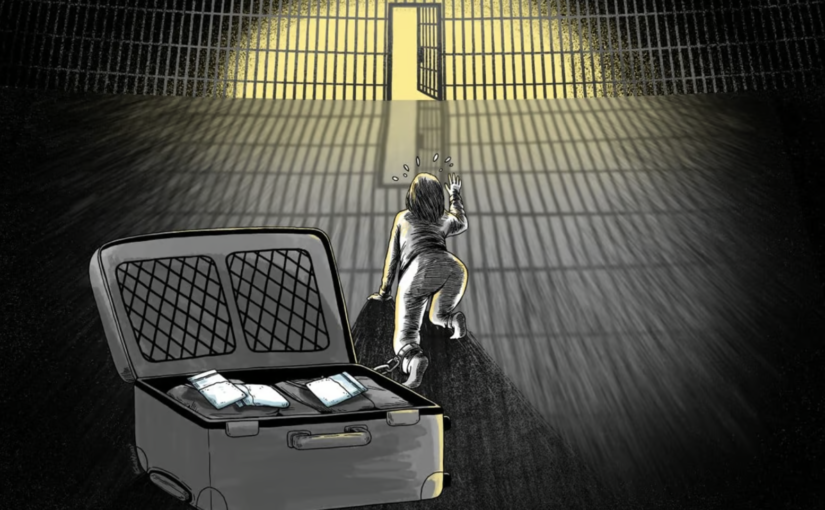Aminah* and her aunt Sunarti* were shocked when they arrived at Hong Kong International Airport and customs officials used an electric drill to take their suitcases apart.
The Indonesian women were arrested for drug trafficking after the officers found 5kg of crystal meth, commonly known as ice, hidden in the bags.
A few weeks before their arrest in June 2019, Aminah, 25, a housewife living in Lombok, had been contacted by her Indonesian friend Kartini* who was working as a domestic worker in Hong Kong.
Kartini said she had befriended a young Nepalese man who was starting a business and needed to bring in materials from Indonesia.
“He was offering US$1,000 per person,” Aminah told the Post. “My aunt was sick and I wanted to use the money to get her treatment in Hong Kong.”
Aminah and Sunarti, 55, agreed to carry two suitcases from Indonesia to Hong Kong, not knowing there were drugs hidden inside.
Aminah’s shock at being arrested and detained at the Tai Lam Centre for Women, a maximum-security prison in the New Territories, took a turn when she found out she was pregnant with her first child.
She gave birth to a boy at Queen Elizabeth Hospital in 2020 and was allowed to keep her baby with her in prison.
The two women spent three years in prison awaiting trial, before being acquitted last year because there was enough evidence to convince the judge they had been tricked.
Aminah, her baby and her aunt have since returned to Lombok.
The women are among a minority of those arrested for drug trafficking or smuggling who succeed in persuading the courts that they were tricked, avoiding Hong Kong’s stiff penalties of up to a life sentence and a fine of HK$5 million (US$640,000).
Data from Hong Kong customs shows that since the abandonment of Covid-19 travel restrictions, more drugs are being smuggled into the city via the airport.
In the first five months of 2023, about 1,840kg of dangerous drugs worth HK$898 million were seized at the airport, 1.5 times more than over the same period last year.
International drug trafficking syndicates have increased the use of couriers smuggling drugs into Hong Kong, according to the authorities.
During the first six months of 2023, 30 inbound air travellers were arrested on suspicion of smuggling nearly 46kg of narcotics worth HK$39 million. In the whole of 2022, 20 air travellers were detained on smuggling charges.
Aged between 14 and 72, they came from Brazil, Estonia, Ethiopia, Madagascar, Uganda, Mongolia, Denmark and the United States.
Father John Wotherspoon, a prison chaplain and chief executive officer of Voice for Prisoners, an NGO that helps people arrested after being duped into trafficking, said he had seen a wide range of tactics used to trick people into carrying drugs.
There were men who tricked their girlfriends after being in long-term relationships, travel agents who offered deals that were too good to be true and online scammers who fooled people into believing they were helping others.
“I would estimate that about 20 per cent of those arrested have been tricked,” said Wotherspoon, 76, a Catholic priest from Australia who has been in Hong Kong for more than 30 years.
“People who have been tricked into becoming drug mules are not criminals or members of drug syndicates, they are innocent victims.”
Over the past eight years, Voice for Prisoners helped 16 people accused of smuggling drugs get acquitted. It is now helping four others whose cases are pending.
Most of those the NGO helped were women. Wotherspoon said single mothers or women in desperate situations tended to be targeted.
For those eventually acquitted, the whole process of gathering evidence to fight the charges took time, which meant sometimes spending years in prison before finally walking free.
Tricked by ‘a good friend’
Malaysian personal assistant Siti*, 51, was caught in June 2018 with 2kg of cocaine hidden in a suitcase after she arrived in Hong Kong from Sao Paulo, Brazil.
She said she was tricked by a Nigerian man she met in Kuala Lumpur and had known for 11 years.
“He was a good friend, he knew my family and would come to our house,” she told the Post.
The man ran a furniture export business in Kuala Lumpur.
“I had done translation work for him, so when he asked me to attend some meetings for him in Sao Paulo and Hong Kong, I agreed,” she said.
When she arrived in Sao Paulo, Siti was told the meeting had been cancelled, but did not suspect anything.
“I stayed in Brazil for three days and was on my way to the airport to go to Hong Kong, when he called from Kuala Lumpur and asked me to help him bring a suitcase of clothes back.”
Customs officers at Hong Kong airport took apart the suitcase and found the narcotics.
By working with her family in Kuala Lumpur, Voice for Prisoners helped collect enough evidence to prove she had been tricked and the jurors at her trial decided unanimously that she was innocent.
The single mother of four was acquitted in December 2020, after being remanded for two years.
Now back in Kuala Lumpur, Siti said she was unable to work because she had to care for her sick mother.
Civil servant Parvati*, an Indian national, was living in Kuala Lumpur when someone she thought was a travel agent offered her an attractive deal on an all-inclusive week-long group tour to Hong Kong in 2019.
“When I landed in Hong Kong, a tour guide told me that the group had not arrived yet and I could spend a couple of days in Cambodia for free while I waited,” she said.
“I had nowhere to stay and I was nervous because I’d never left Malaysia before, so I went to Cambodia.”
She was in Phnom Penh for three days with the tour guide. Before leaving for their flight to Hong Kong, he asked if she could help take a bag back for him.
“I started to suspect something,” she recalled. “I kept asking, why do I have to take it?”
She said she asked customs officers in Phnom Penh International Airport to scan the bag twice because she was worried she was being set up, but they found nothing.
“I thought everything was fine after that,” Parvati said. “I was just about to leave Hong Kong airport when customs officers stopped and searched my bag.”
She was arrested after they found 4kg of cocaine, and spent 30 months detained at Tai Lam.
When her case went to court in 2021, her lawyer was able to present text message records between her and those alleged to have tricked her as evidence. The prosecution dropped the case.
‘The real criminals get away’
Lawyer Jonathan Midgley, 57, who has defended those accused of smuggling drugs into Hong Kong, recalled a Thai woman who was told she would never see her children again if she did not carry a bag of narcotics to Hong Kong.
“Luckily she was acquitted,” he said.
Criticising the long sentences handed out to mules convicted of drug smuggling, he said: “Mules often get hit with a 20-year sentence, while the people who are behind it rarely get caught.
“The rationale is that punishing mules severely acts as a deterrent but I doubt that it does, because many are tricked or forced to do so under duress.”
During his years of working with prisoners, Wotherspoon has learned of various drug syndicates shipping narcotics into Hong Kong from around the world.
He has travelled to Africa, South America, Malaysia and Thailand to urge syndicate members to stop tricking innocent people into moving drugs.
“I flew out to Sao Paulo in 2018 to find the drug lords there,” he said. “I’d heard that they hung out in a canteen in the slums.”
Armed with just his travel bag, passport and a cross around his neck, he went to the canteen and began asking for the people he believed were involved in smuggling drugs.
“I approached one group and pleaded with them to stop tricking innocent people into smuggling drugs,” he said.
He recalled what one of them said to him: “If you value your life, you will leave now.”
Wotherspoon said the purpose of his trip was not only to confront drug lords and beg them to stop, which he admitted was unlikely to work, but also to retrace the steps of the people Voice for Prisoners was helping and gather evidence.
He has previously used evidence gained and proof of his interactions with drug syndicates to write letters to judges overseeing cases that have ended in acquittal, most notably in the case of Li Dandan, a Chinese national who was tricked into smuggling 2kg of ice into Hong Kong via Kuala Lumpur.
The woman from Guangzhou was arrested at Hong Kong airport with the drugs in her backpack in 2015. She was acquitted in 2018.
Wotherspoon said it was important to deter people from falling for the tricks of drug smugglers.
To do this, his NGO asks prisoners arrested for smuggling drugs to write letters warning others not to do what they did.
Those who take part in this anti-drug campaign are sometimes offered reductions in their sentences, and the NGO is convinced it has helped discourage many from becoming drug mules.
Syndicates use a variety of methods to get people to carry drugs across borders for them.
Wotherspoon said it was much harder to help suspects caught after swallowing drug-filled pellets concealed in their bodies.
“I have never seen someone in those cases get acquitted, it is too hard to prove that they were forced,” he said.
A spokesman for Hong Kong customs said that in combating cross-boundary drug trafficking, the department had been closely monitoring global and local narcotics trends and adopted effective enforcement tactics.
On June 26, customs officers at the airport stopped a 42-year-old woman who arrived from Kuala Lumpur with 14kg of suspected cocaine found in boxes of agar powder.
Just nine days earlier a 25-year-old woman who arrived from Brazil via Kuala Lumpur was arrested after officers found seven perfume bottles with false compartments used to conceal almost a kilogram of suspected cocaine.
On May 14, a 62-year-old man from the United States, who arrived from Sao Paulo via Paris, was caught with liquid cocaine valued at HK$8 million soaked into 17 bedsheets.
“Swift adjustments on enforcement strategies and resources deployment have been made with a view to stepping up actions against all kinds of drug trafficking activities through different channels,” the spokesman said.
He also said members of the public could report suspected drug trafficking activities to the department’s 24-hour hotline (2545 6182) or its dedicated crime-reporting email account ([email protected]).
* Names changed to protect the identity of those interviewed

